Wheelchair-friendly pool cues feature forward-balanced designs, adjustable lengths, and ergonomic grips that enhance control without compromising position. For competitive play, look for cues with screw-in extensions, precision-engineered joints, and customizable weight systems made from carbon fiber or exotic woods. Your cue must meet tournament regulations (max 58 inches length, 12.5mm tip diameter) while providing stability during shots. Organizations like BWPPA can connect you with specialty manufacturers and community resources for your ideal performance equipment.
The Evolution of Adaptive Cue Technology
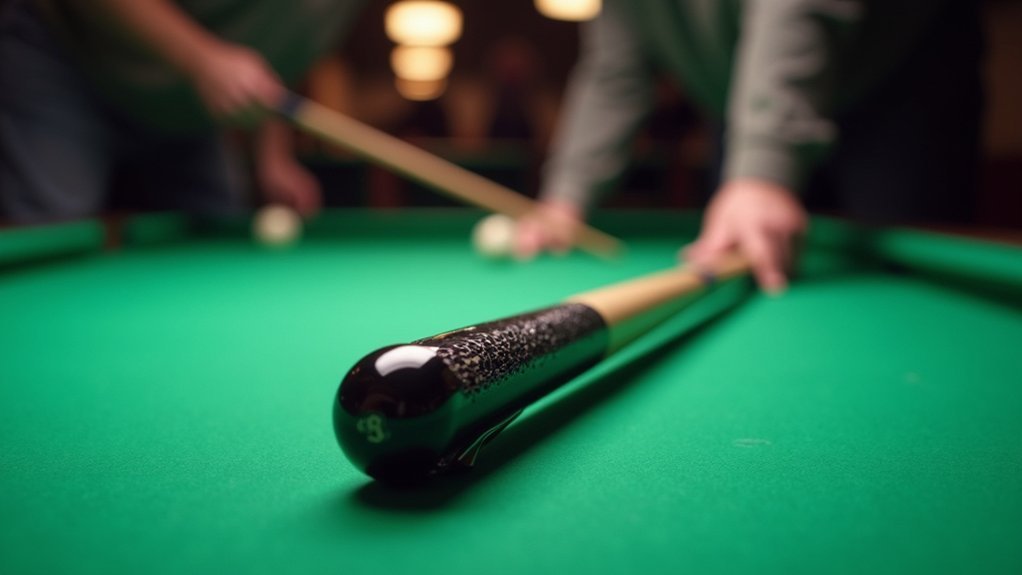
While traditional pool cues once presented significant challenges for wheelchair users, adaptive cue technology has evolved dramatically over the past decade.
You’ll find modern cues specifically engineered with forward balance and optimized weight distribution, making competitive play more accessible from a seated position.
Today’s customizable cues accept extensions and feature precision-engineered joints that help you reach difficult shots without compromising stability.
Innovative joints and extensions transform adaptive cues, making those once-impossible angles accessible without sacrificing your shot’s precision.
These innovations minimize vibration and jerking motions—crucial factors for maintaining accuracy when you have limited mobility.
Local cue makers have embraced community feedback, collaborating directly with wheelchair athletes to develop specialized equipment.
This partnership has resulted in high-performance cues that prioritize both inclusivity and competitive advantage, using premium materials that enhance durability while accommodating your unique playing style and physical requirements.
Key Features of Wheelchair-Optimized Pool Cues
When you’re seeking a wheelchair-friendly pool cue, you’ll want to focus on models that feature extension systems, which allow you to reach difficult shots without compromising your position.
The forward-balanced design of these specialized cues gives you enhanced control and stability when shooting from a seated position.
These thoughtful engineering elements work together to create an adaptive playing experience that maintains competitive integrity while addressing the unique needs of wheelchair players.
Extension Systems
Three key extension systems make wheelchair-optimized pool cues a game-changer for players with mobility challenges. You’ll find that the right amount of customization allows you to reach difficult shots without compromising your seated position.
| Extension Type | Benefits |
|---|---|
| Screw-in | Quick length adjustments for varying reach needs |
| Custom-fitted | Tailored to your specific mobility requirements |
| Weight-balanced | Maintains control despite extended length |
| Forward-balanced | Improves stability during wheelchair play |
| Multi-section | Allows incremental length adjustments |
Action’s Athena line and other professional cues offer these systems to enhance your game. The extended cue gives you access to shots that would otherwise be impossible from your chair, while still maintaining the precision and control you need for competitive play.
Forward-Balanced Design
Unlike standard pool cues, forward-balanced designs specifically address the unique playing position of wheelchair users by shifting weight distribution toward the tip of the cue.
This specialized balance enhances stability and control, allowing you to achieve more precise aim and smoother strokes during competitive play.
As a wheelchair pool player, you’ll notice that forward-balanced cues reduce the effort needed to maintain a straight line on the object ball—crucial when your mobility is limited.
These cues also minimize vibrations during your stroke, improving overall feel and consistency.
You can customize forward-balanced cues to your specific preferences, adjusting grip size, weight, and core design for peak performance.
Most designs accept extensions too, giving you access to difficult shots that would otherwise be challenging in cue sports competition.
Materials and Design Considerations for Accessibility
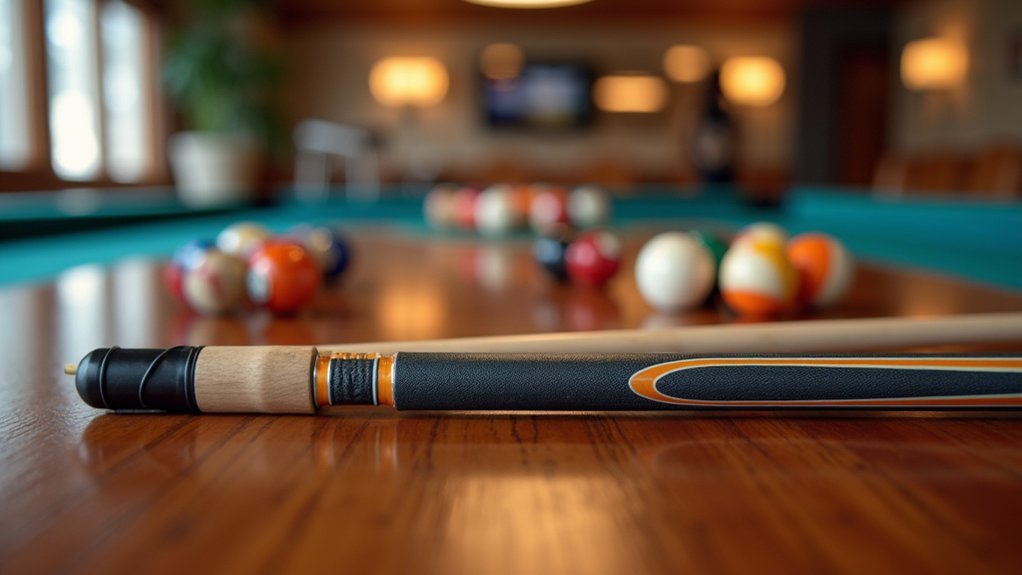
Although most standard pool cues serve casual players adequately, wheelchair users require specialized design elements that maximize comfort and performance.
Standard pool cues may satisfy casual players, but wheelchair athletes need specialized designs for optimal comfort and competitive performance.
When selecting a professional cue, you’ll want to focus on high-quality materials like exotic woods, carbon fiber, or fiberglass that offer superior durability without adding unnecessary weight.
Look for cues with precision-engineered joints that provide enhanced stability during play—a critical feature when shooting from a seated position.
The shaft material matters greatly; premium hardwoods like maple or ash deliver better control and feel.
Consider models with weight adjustment capabilities through customizable weight bolts, allowing you to fine-tune balance to your specific needs.
These material and design considerations aren’t just luxuries—they’re essential components that make competitive play more accessible and enjoyable for wheelchair users.
Customizable Length and Weight Systems
Since wheelchair players operate from different heights and angles than standing competitors, customizable length systems have become essential in competitive play.
These adjustable cues allow you to modify reach based on your specific needs, ensuring ideal positioning for various shots without compromising technique.
Weight adjustability offers another significant advantage.
Professional cues with weight bolts let you fine-tune the balance according to your preference, enhancing control and reducing fatigue during extended play sessions.
Forward balanced cues specifically designed for wheelchair players enhance handling while minimizing strain.
For serious competitors, collaborating with local cue makers provides tailored solutions that address your unique requirements.
These custom-built cues can feature specific weight distributions that complement your playing style, improving stability and performance as you compete at higher levels.
Ergonomic Grip Options for Various Mobility Challenges
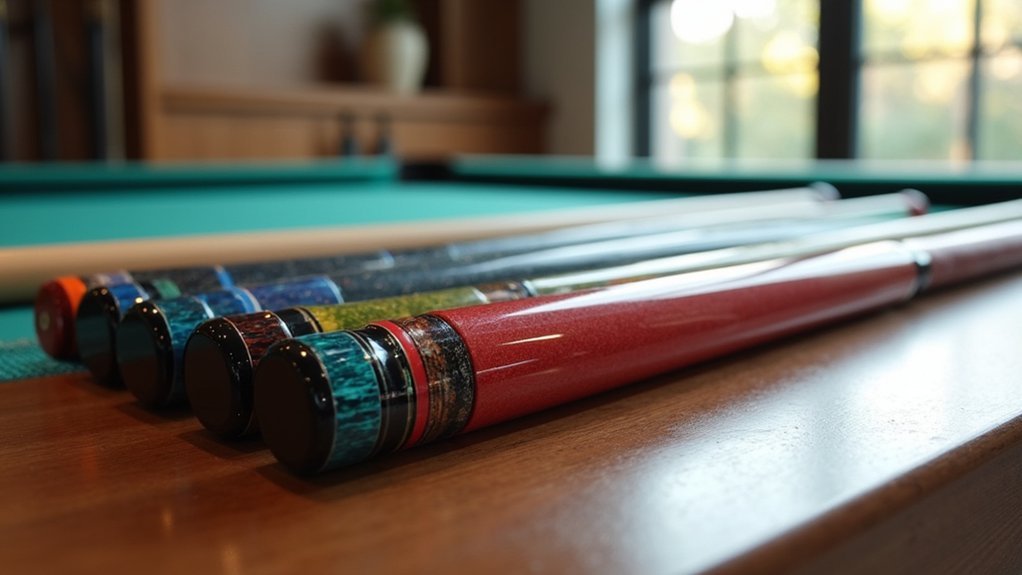
Ergonomic grips represent one of the most essential adaptations for wheelchair players facing mobility challenges. You’ll find that these specialized designs considerably reduce strain while enhancing your control during competitive play.
| Grip Type | Benefits | Best For |
|---|---|---|
| Rubberized | Enhanced traction, slip resistance | Limited finger strength |
| Textured | Improved stability, feedback | Dexterity issues |
| Customizable | Adaptable to unique hand shapes | Prosthetic users |
| Forward-balanced | Reduced effort, better weight distribution | Players with fatigue concerns |
| Adjustable | Modifiable comfort settings | All competitive players |
When selecting your cue, consider how these grip options align with your specific needs. Many competitive players benefit from adjustable grips that you can modify between matches, ensuring your equipment works with you, not against you.
Balance and Control: Engineering for Wheelchair Players
Balance and weight distribution represent critical engineering factors that greatly impact your performance as a wheelchair player. Forward-balanced cues enhance your control during shots, allowing more effective handling from a seated position.
For wheelchair players, forward-balanced cues provide enhanced control and handling precision from a seated position.
When selecting your cue, prioritize those that minimize jerkiness during strokes, as proper weight distribution directly affects your ability to aim and maneuver precisely.
You’ll benefit from customizing your cue weight to match your personal preferences—this customization isn’t just for comfort but considerably improves competitive performance.
Professional cues constructed with high-quality materials provide better stability and accuracy, essential qualities when playing from a wheelchair.
Consider connecting with local cue makers for tailored solutions that address your specific needs, ensuring you’re equipped with equipment engineered for your ideal performance in competitive settings.
Professional Players’ Equipment Preferences
Professional wheelchair players gravitate toward cues with forward balance and adjustable weights that provide exceptional control during competitive play.
You’ll notice many elite players selecting high-quality materials like carbon fiber or exotic woods that offer the crisp feel needed for precise shots from a seated position.
Custom extensions have revolutionized the sport, with innovations allowing players to maintain proper technique while eliminating the need to overreach during challenging shots.
Elite Players’ Cue Choices
When examining the world of competitive billiards, elite wheelchair athletes demonstrate clear preferences in their equipment selections.
You’ll find these players gravitating toward cues with forward balance and customizable weight distribution, which enhance control during competitive play.
Professional wheelchair athletes typically select cues featuring:
- High-quality materials like exotic woods and carbon fiber for superior performance
- Precision-engineered joints such as piloted or quick-release designs for stability
- Premium leather tips that provide the enhanced control necessary for executing complex shots
Many wheelchair competitors invest in custom cues crafted specifically to their specifications, incorporating personalized touches that reflect their individual style while addressing their unique playing requirements.
These custom designs combine both aesthetic appeal and functional excellence.
Custom Extension Innovations
Beyond the baseline equipment choices of elite players, custom extension innovations have revolutionized competitive play for wheelchair billiards athletes. You’ll find screw-in extensions, like those in the Action Athena line, particularly valuable for reaching difficult shots while maintaining stability.
When considering custom cues, prioritize forward balance to improve handling from your seated position. This critical feature enhances comfort and control during competitive play.
Professional cuemakers now offer tailored solutions where you can specify weight distribution and length to match your individual requirements.
For the most personalized experience, connect with local cuemakers. Direct communication allows for better customization options, ensuring your equipment perfectly addresses your specific needs.
These innovations have made competitive play more accessible and adaptable for wheelchair users seeking professional-level performance.
Specialized Extensions and Mounting Accessories
For wheelchair players seeking greater table coverage, specialized extensions and mounting accessories represent game-changing innovations. You’ll find various options specifically designed to enhance your competitive play without compromising position or comfort.
- Screw-in Extensions – Mezz cues accept customizable extensions that you can tailor to your specific reach requirements, giving you versatility for different shooting angles.
- Adjustable Solutions – Action’s Athena line offers adjustable extensions (around $115) that you can modify during gameplay as table situations change.
- Custom-Balanced Options – Working with local cuemakers provides the advantage of forward-balanced designs with extensions specifically engineered for wheelchair players’ needs.
When selecting extensions, consider communicating directly with local craftsmen who can better understand your specific requirements and create solutions that enhance your competitive edge.
Tournament-Approved Adaptive Cues and Regulations
You’ll need to guarantee your adaptive cue meets official tournament standards before entering competitive play, with organizations like the BWPPA and WDBS providing clear guidelines for approval.
During competitions, you’re entitled to reasonable accommodations for your adaptive equipment, including extra time for setup and specialized mounting systems.
Tournament officials carefully balance accessibility needs against potential competitive advantages, guaranteeing modified cues provide equal opportunity without offering unfair benefits to players.
Official Approval Standards
When competing in sanctioned pool tournaments, wheelchair players must confirm their adaptive cues meet rigorous approval standards established by governing bodies like the World Pool Association (WPA) and British Wheelchair Pool Players Association (BWPPA).
Your adaptive cue must conform to the same basic specifications as standard cues: maximum length of 58 inches with a minimum tip diameter of 12.5mm. Tournament officials will inspect all equipment before competition to verify compliance.
- You’ll need to demonstrate your adaptive equipment provides no unfair advantage over traditional cues.
- Only non-motorized, manual aids are permitted in competitive play.
- Your adaptive cue must maintain the skill element of the game while accommodating your specific mobility needs.
Remember that these standards exist to promote fair competition while making the sport accessible to all players.
Accessibility During Competition
How can wheelchair players guarantee they’re competition-ready?
You’ll need tournament-approved adaptive cues that meet specific regulations while addressing your mobility needs. Organizations like BWPPA and WDBS have established standards that allow for specialized equipment without compromising competitive integrity.
Your adaptive cue must adhere to weight and length regulations while providing the stability and grip you require. Many players opt for custom solutions featuring extensions and forward balance designed specifically for wheelchair play.
The Cannonaid, a patented invention, has gained popularity among competitors with limited mobility.
Remember that WDBS tournaments classify players based on disability type, ensuring fair competition while accommodating adaptive equipment.
With the right cue that balances personal comfort and competitive standards, you’ll be positioned to perform at your best in official wheelchair pool competitions.
Competitive Advantage Considerations
Competitive advantage in wheelchair pool extends beyond mere equipment selection to a careful balancing act between adaptation and regulation.
When selecting tournament-ready adaptive cues, you’ll need to guarantee they comply with WDBS and BWPPA standards while still addressing your specific needs.
Consider these vital factors:
- Material selection – Carbon fiber and premium hardwoods offer superior control without violating regulations, giving you confidence during high-pressure shots.
- Precision joints – Tournament-approved cues with engineered connections provide stability essential for competitive play.
- Customization boundaries – Work with experienced cuemakers who understand both adaptive requirements and tournament specifications to create legal modifications that enhance your gameplay.
Remember that properly balanced adaptations provide accessibility without crossing into unfair advantage territory—a distinction officials carefully monitor during sanctioned events.
Maintenance Tips for Adaptive Pool Equipment
Proper maintenance of your wheelchair-friendly pool cue guarantees peak performance and extends its lifespan considerably.
Regularly wipe down your cue shaft and tip with a soft cloth to remove oils and chalk buildup that can affect your shots.
Inspect the joints and connections on your adaptive cue for wear or damage, applying specialized joint lubricant when necessary. This maintains stability critical for wheelchair players who rely on precise control.
Store your equipment in temperature-controlled environments to prevent warping from humidity fluctuations.
Replace worn tips with high-quality leather options customized to your playing style.
Don’t forget to periodically check your cue’s weight and balance. As a wheelchair player, you may need specific configurations adjusted over time to accommodate your technique and comfort preferences.
Where to Source Quality Wheelchair-Friendly Cues
Three primary sources exist for acquiring top-quality wheelchair-friendly pool cues that meet your specific needs.
Finding specialized wheelchair-friendly pool cues requires exploring custom makers, adaptive manufacturers, and community resources.
When searching for the perfect cue to enhance your competitive play, consider these options:
- Local custom cue makers – They provide tailored solutions specifically designed for wheelchair players, with adjustable weight distribution and balance configurations that match your unique requirements.
- Professional manufacturers – Brands like Mezz and Action’s Athena line offer cues that accept extensions, providing essential reach for challenging shots while maintaining weight adjustability features.
- Community connections – Engage with organizations like the British Wheelchair Pool Players Association (BWPPA) and participate in online forums where experienced players share recommendations for reputable brands and specialized cue makers.
Frequently Asked Questions
What Pool Cue Do Professional Pool Players Use?
You’ll find pros using custom high-performance cues made from exotic woods or carbon fiber, featuring premium leather tips and precision-engineered joints. They’ll often choose cues with adjustable weights to match their playing style.
Can People in Wheelchairs Play Pool?
Yes, you can definitely play pool from a wheelchair. Many wheelchair users compete in specialized tournaments organized by groups like BWPPA and WDBS, often using adaptive cues with extensions for better reach.
What Weight Pool Cue Do Most Pros Use?
Most pros use cues weighing 18-21 ounces, with 19 ounces being the most popular choice. You’ll find many professionals customize their cue weight to match their playing style and specific shot requirements.
How Do Pros Travel With Pool Cues?
You’ll find pros typically travel with their cues in padded, protective cases that allow disassembly into multiple pieces. They’ll often check these as luggage when flying, ensuring proper insurance coverage for their valuable equipment.
In Summary
Whether you’re a competitive player or just starting out, wheelchair-friendly pool cues allow you to excel at your game without compromise. You’ll find these adaptive tools blend professional performance with accessibility in remarkable ways. Invest in equipment that meets your specific needs, and you won’t have to sacrifice quality for functionality. The right adaptive cue isn’t just equipment—it’s your pathway to competitive success on your terms.

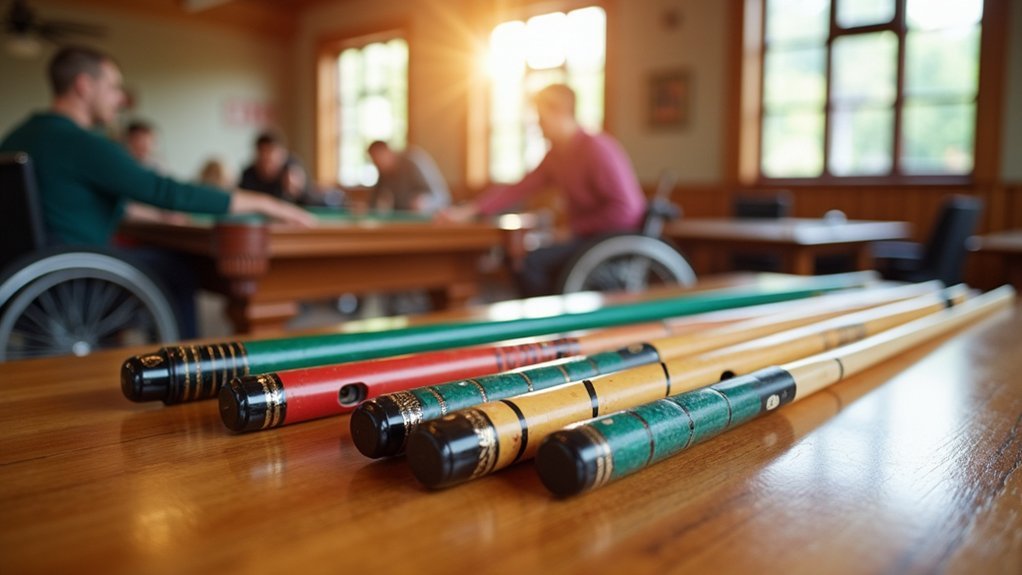
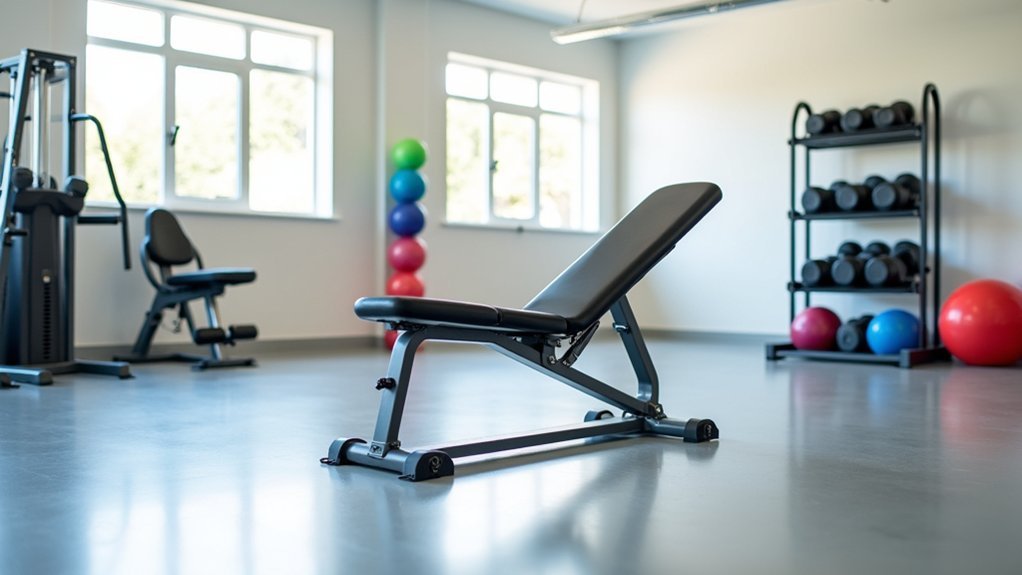
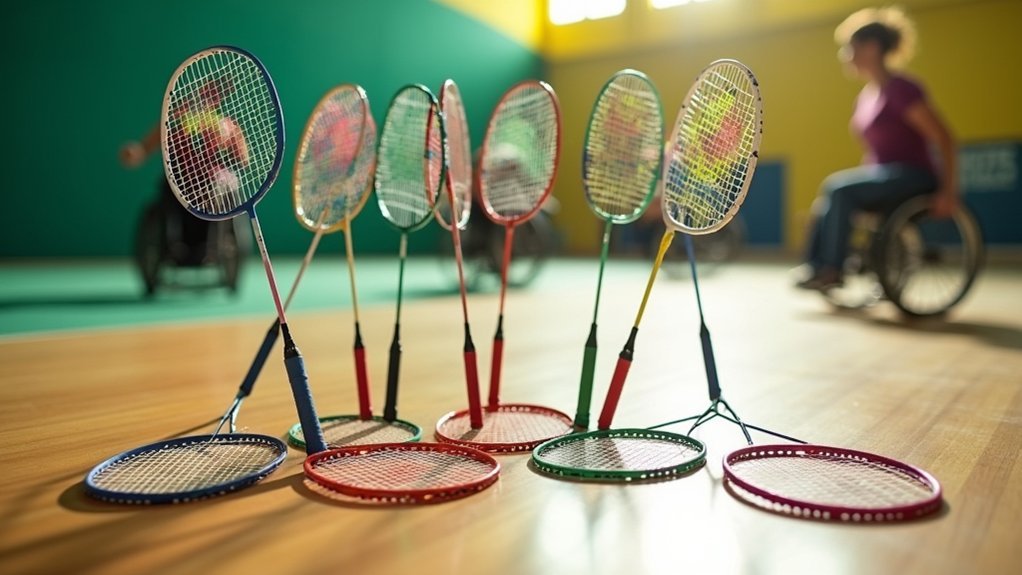
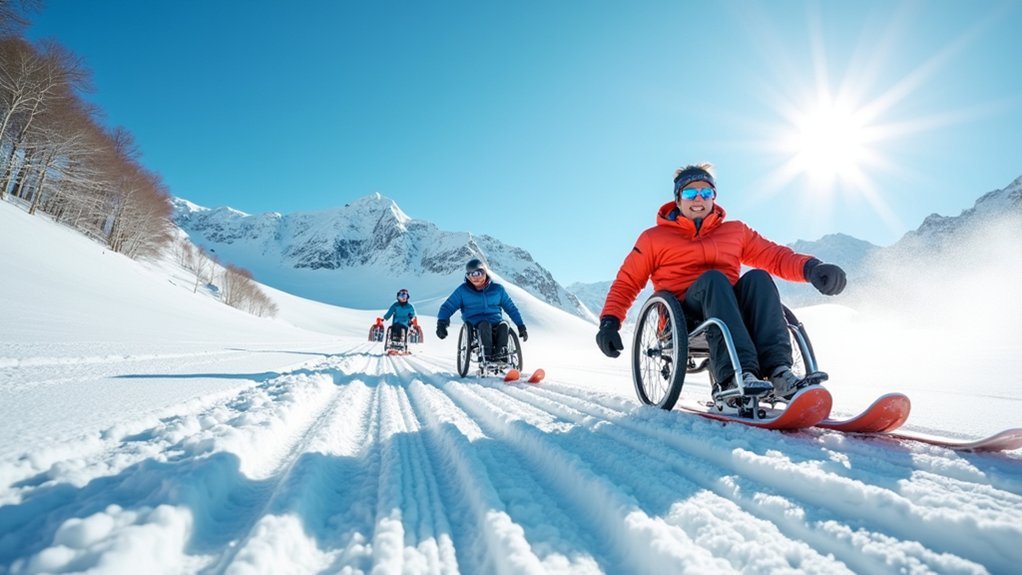
Leave a Reply